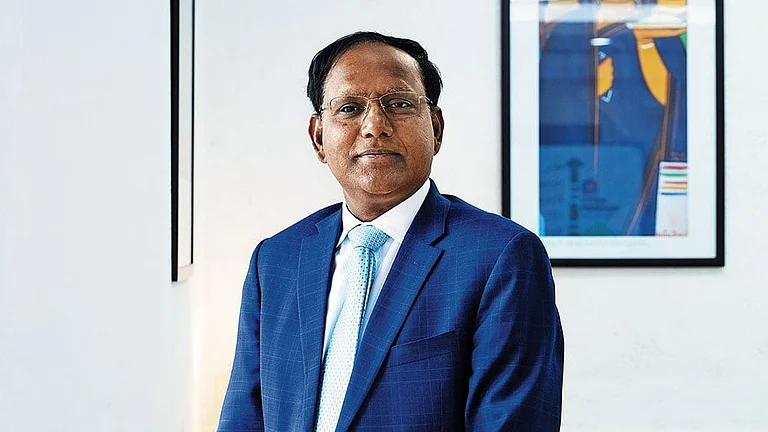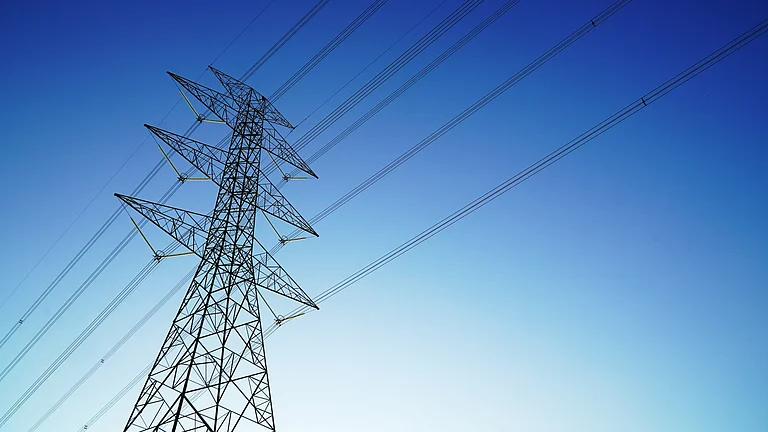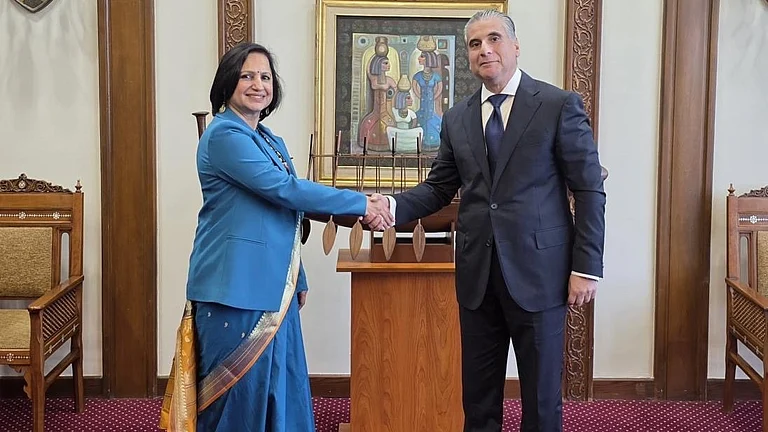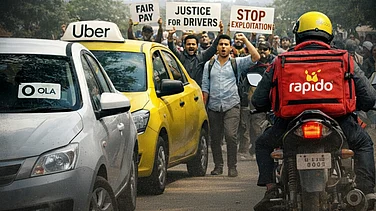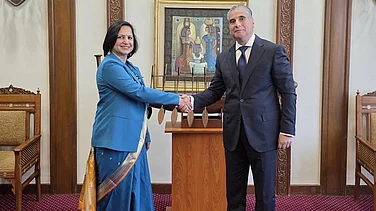Vinay Dube believes aviation is a straightforward business. And he should know. Starting his career with American Airlines as an operations research analyst before progressing to a managerial role, the industry veteran later held leadership roles in a travel technology company, Sabre Inc. He has spent most of his three-decade-long career steering airline companies as Senior VP – APac for Delta Air Lines or CEO of Jet Airways and GoAir (previously known as Go First).
Now, as Founder, MD and CEO of the Rakesh Jhunjhunwala-backed Akasa Air, he will leverage his experience to help the newest airline company not just take to the skies in India but also gain customer loyalty while staying competitive.
He tells Outlook Business how he will achieve this by focusing on three core aspects—build a company that offers efficient and on-time operations with a viable cost structure, assemble an employee-centric organisation, and model an empathetic service culture. He'd much rather concentrate on nailing these details than looking in the rearview to see what his competitors are up to.
Edited excerpts:
How do you plan to compete against existing and upcoming competitors, be it full-service carriers like the Tata-owned Air India, Jet Airways or low-cost carriers (LCCs) like Indigo, SpiceJet and GoFirst?
Aviation has always been a highly competitive sector. So, this (the entry of new players in India's aviation sector) is nothing new for my senior team leadership or me, which brings decades of experience.
The success of any organisation is not to focus on other people but on yourself, your customers and your employees. In that respect, we are no different. We are creating an efficient and empathetic airline for customers; to do that, we must create an employee-centric organisation.
Finally, you need to have competitive cost structures to create affordable fares. These are the business aspects we are focused on. And if we remain grounded and focused on this, we will do just fine.
We have not entered this market because we think that getting passengers from other brands is the key to success. India will get over 1,000 planes in the next 15 to 20 years. We hope that over 100 of those can be Akasa's over a while.
However, since all LCCs will tap the same consumer wallet, won't competition be rife?
The average middle-class consumer segment comprises around 300 million people today. Considering the India Inc story in the next ten years, this will grow to 450 million. So, our success is not dependent on the performance of other aviation companies since we can focus on the additional 150 million customers and we have the headroom to add another 100 aircraft.
Moreover, staying competitive is about getting the fundamentals right. You must run your airline efficiently and on time, be empathetic towards customers, have an appealing onboard product, and network structure as well as have a cost structure that allows you to offer affordable fares to your consumers. That is how you win, whether it is us or anyone else. Their ability to have their head down while executing these will separate one player from another.
But aren't these aspects also the same challenges that aviation companies face? Timely flights are often dependent on situations outside your control. And there have been too many incidents of poor customer handling recently, training notwithstanding. How will you handle these dynamic challenges?
Yes, we are not immune to these issues and must manage through them. What we have going for ourselves is a professional ownership and management structure, which is extremely important.
Many airlines know the theory of cost structure, empathetic customer service, and efficient as well as reliable operations. But not all airlines that know this theory can deliver any, or all, of these aspects.
So, when it comes down to execution, the quality of the management team differentiates one airline from the other. Our management team comprises aviation professionals. Hence, we hope to execute this as well as anyone globally, not just in India.
There have been instances of large airlines being unable to manage their financial operations in India. How will Akasa scale up prudently with enough cash reserves for the long haul?
What you define as a behemoth or too big is very small by the aviation standards of companies I have spent most of my life at it. I spent a decade at Delta Airlines, which had a fleet of over 1,000 aircraft with years of profit and the highest customer satisfaction in its class in the US. I believe these things can be done, and we hope to do these at Akasa.
And how so?
Firstly, you must have a competitive cost structure. Secondly, you need an end-to-end customer experience, including operational liability and warm guest service. Thirdly, you should have a well-capitalised balance sheet. We have focused on all three from day one, which we will sustain to create a durable business.
Let's take the aspect of a competitive cost structure—it is easy to say, but it boils down to fuel as the highest input cost. While many presume this is the same for everyone, it is not so. The type of aircraft you have and how you operate it makes a big difference to your fuel consumption.
Similarly, how you buy and lease aircraft and the structure you have at airports and your sales and distribution strategy need the expertise of an experienced and committed management team. Here's where we can excel.
What learnings from your Delta Airlines days will you emulate at Akasa?
I will broadly divide this into three aspects. The first is the individual human aspect like how we serve you. the second is the hard product, which includes the quality of the seat or food. Lastly is the network's reliability, which covers whether we run on time, our cancellation rates, queue time, the number of minutes the first bag arrives after the flight lands, etc.
Let me highlight the last element to show the massive difference between theory and execution. Running an on-time operation requires extensive planning before you can execute it.
The structure of the network, how you chart aircraft routes, identifying strategic gaps in the schedule, the timeliness of the first departure to avoid ripple delays through the day, the buffers in the system, where spares are strategically located, or the utilisation of the aircraft—these involve a fine balance between one's ability to generate revenue and the ability to create a reliable network.
These decisions must be taken after a lot of number crunching and review of historical data and can lead different airlines down different paths. So, these are some examples where you can have the theory, but its execution needs a lot of work. Hence, my biggest lesson is to get pros to run the business rather than reinvent the wheel.
The biggest constraint in this sector is a paucity of qualified pilots and other professionals. How is Akasa Air addressing this while also dealing with the challenge of poaching?
When it comes to retention, you can't create strong customer service without having an employee-centric organisation. If we don't treat our employees with dignity and respect, they deserve to go elsewhere. I am not too worried about this because we have the ability to help create the professional skillsets needed to run a powerful airline.
Recent incidents have highlighted how the crew lack empathy even after training sessions. How will you train your current workforce on these softer elements?
The softer elements depend on how you hire and train people and the culture of empathy and kindness you create. Those things come around with a lot of human interactions. You won't find that in an excel spreadsheet.
We recently launched our learning centre in Gurugram, where we will provide training in a manner consistent with Akasa's corporate culture and the service and safety ethos we want to create. It is at every level, whether pilots, flight attendants or ground crew. Where required, we will also team with some institutions worldwide to help us.
How many aircraft does Akasa currently have in its new fleet?
Last week we took the delivery of our first Boeing 737 MAX aircraft in Seattle, USA. Our total order of 72 aircraft includes an initial delivery of 18 by March 2023, followed by delivery of the remaining 54 aircraft over the next four years. Powered by CFM fuel-efficient LEAP-1B engines, this is the greenest fleet in India.
Have you finalised the domestic routes for Akasa?
We have generally identified a superset of routes, flying from the metro to tier-II and III cities. We can't zoom in on the routes because the airports must give us permission to land, park, office space and slots. This will be possible only after we get our operator's permit which we hope to get by this month-end.
As required by Indian aviation guidelines, to begin with, we will be a domestic carrier. We hope to launch our own international services in the second half of 2023.









